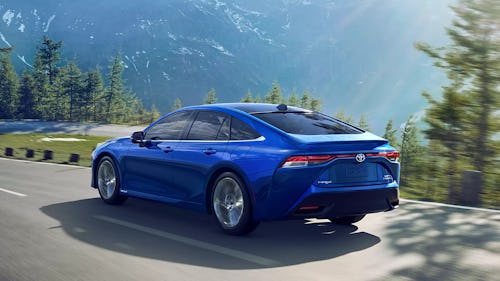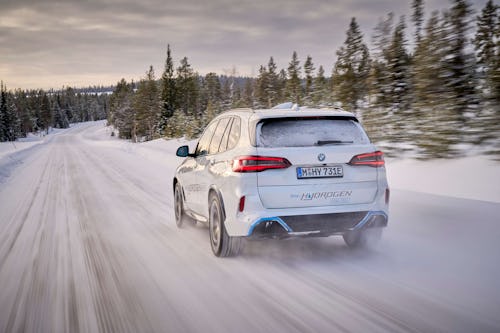
When it comes to eco-friendly vehicles, most people think batteries over hydrogen. A new partnership between BMW and Toyota, however, may be giving the latter apparoch a desperately-needed publicity boost. Pieter Nota, BMW’s sales chief told Nikkei that BMW will be mass-producing and selling fuel-cell EVs made with Toyota as early as 2025.
Toyota has a longer history working on hydrogen fuel cell EVs and recently showed off its 2022 Mirai that can get up to a 400-mile range. BMW is also working on hydrogen technology and is looking to produce its iX5 Hydrogen before the end of the year.

This partnership between the two car makers means they’re both committed to pursuing hydrogen fuel cells as an alternative to the more popular battery-powered electric vehicles. Although, you could also see this move as just another way to persuade customers to ditch their internal combustion engine cars.
Busted BEVs —
On its own, Toyota is a little behind when it comes to battery-powered EVs. So far, the bZ4X is its only available BEV, and it’s having a pretty rough introduction to the market with a recent major recall. For Toyota, partnering with BMW could be a way to solidify its position early in the hydrogen fuel-cell-powered EV market, particularly after fumbling so poorly with BEVs.

BMW is a little more invested in BEVs than Toyota, with several models available already and plenty more on the way, including its i4 eDrive35 and its iX SUV. BMW does seem to have given its vote of confidence on hydrogen-powered cars with this partnership with Toyota, though.
More EV options —
Toyota may have been one of the first major car makers to test the waters with hydrogen-powered EVs, but it’s clear that battery-powered EVs are dominating the market. Hydrogen fuel cells definitely have their benefits compared to traditional batteries, like not sacrificing range in extremely cold temps and being much faster to charge. When you take one look at the EV market, it’s clear that batteries are clearly the more popular option.
Now that these two major companies have committed to building more hydrogen-powered EVs, it could make hydrogen-powered cars a more serious contender to battery-powered EVs. We’ll have to wait and see what comes out of Toyota and BMW’s partnership, but having more EVs options — be it hydrogen-powered or battery-powered — is another solid step forward for the overall auto market.







